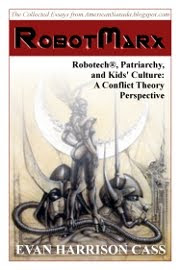

Robot Marx - Robotech®, Patriarchy, and Kids' Culture: A Conflict Theory Perspective is now available as a book. I'll be premiering it this weekend at Saint Paul, Minnesota's SpringCon.
Robot Marx -- "The Collected Essays from AmericanNarada.blogspot.com" -- is a 5-inches wide x 7.5-inches tall, square-bound, full-color, 38-page paperback. Sold at-cost, this "Not-for-profit Academic Scholarship intended for Education" publication is available for $5.00 U.S. From the back cover:
When ROBOTECH -- the classic 85-episode "sci-fi soap opera" cartoon that introduced a generation of American kids to Japanese animation -- premiered in 1985, it stood out from its contemporaries. Unlike iconically similar G.I. JOE and TRANSFORMERS, ROBOTECH's characters lived and died, met and fell in love, and expressed real emotions and evolved as individuals. The program spawned toys, comix, role-playing games, novels, and other pop-cultural artifacts. From the Conflict-Marxist assumption that America is a patriarchal society, ROBOTECH is a fascinating case study: it featured women heroes in leadership positions, a cross-dressing male hero, and an essentially anti-war message, among other subversive elements. ROBOT MARX critiques ROBOTECH, its marketing, and its fandom from this perspective, in the process discussing concepts such as gender representation, diva citizenship, and archetypes. An enjoyable academic expression of fandom.
The book was born from a number of influences. First, last month's "remastered" ROBOT MARX project* re-sparked my latent ROBOTECH fandom. From 2001 to 2004, I edited and published the "official" unofficial ROBOTECH fanzine, Emissaries; Robot Marx was an excuse to indulge in that fandom while being able to provide something new for my fellow fans again. Second, I was inspired after reading Stephen Bissette's Teen Angels & New Mutants to do something similar; I wanted to do for ROBOTECH what he did for Rick Veitch's BRAT PACK. In an admittedly limited way, Robot Marx fit the bill. And third, pulling the book together allowed me to flex my publishing muscles (I have an Associate's degree in Printing & Publishing) in preparation for the forthcoming American Narada: India 1 reflections and comix collection. Using nothing but freeware, Robot Marx was a fun DIY exercise.

Midwest Comic Book Association's SpringCon "Comic Book Celebration" is held at the Minnesota State Fairgrounds' Grandstand from 10 AM to 5 PM on both Saturday and Sunday (May 21 & 22); with a canned-food donation, admission is only $10 for the weekend. I'll be tabling alongside friend and uber talented tattoo-artist/cartoonist/designer, Jennifer "Inkbunny Diaries" Young. If you're in the region, I encourage you to attend. MCBA puts on a great show. I'd love to meet AMERICAN NARADA's readers and my fellow ROBOTECH and comix fans, so, please -- if you do attend -- stop by my table and say "Hi!"
Robot Marx will be available for purchase there. The book is also available online via IndyPlanet.
- - -
* ROBOTECH ® and all associated concepts, names, designs, and images are trademark and copyright Harmony Gold USA, Inc. 1985-2011. Application of such for the ROBOT MARX project by Evan Harrison Cass is based on the U.S. Copyright principle of Fair Use for not-for-profit "criticism, comment, news reporting, teaching, scholarship, and research." No infringement of Harmony Gold USA, Inc.'s or associated companies' and individuals' rights is intended.




 *
*